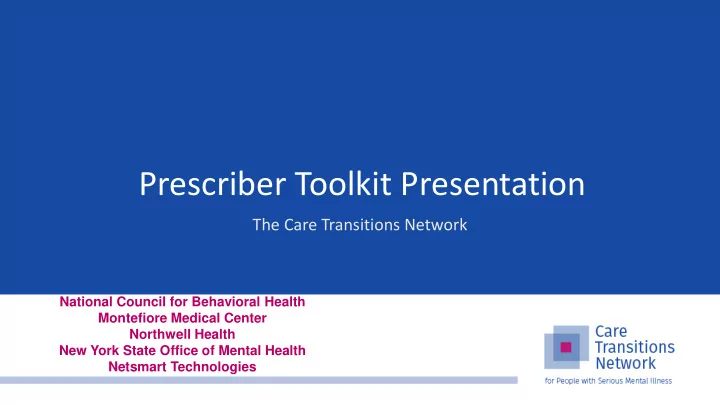

Prescriber Toolkit Presentation The Care Transitions Network National Council for Behavioral Health Montefiore Medical Center Northwell Health New York State Office of Mental Health Netsmart Technologies
Learning Objectives • By the end of this webinar, attendees will understand: • Key steps for antipsychotic treatment planning • How to access, navigate, and use the online toolkits: • Clozapine Provider Toolkit • Long-Acting Injectable Provider Toolkit
Introduction • Key factors in antipsychotic treatment planning: • Dosing • Duration of treatment • Adherence • LAIs prevent poor adherence • Clozapine works when others don’t • LAIs and clozapine are underutilized due to: • Prescriber discomfort • Difficulty obtaining these meds • Patient refusal
Key Steps for Antipsychotic Treatment Planning
First, confirm the diagnosis For Schizophrenia-Spectrum disorders, diagnoses often change
The chart diagnosis may not be accurate We have individual trainings to help clinicians better diagnose psychotic disorders
Next, choose an agent based on patient history • Is the patient in their first episode and antipsychotic naïve? • Is there a history of good response to an agent? • Is there history of poor tolerance to certain oral agents or preferences based on side effect profile? • Is there history of medical co-morbidities (obesity, diabetes, metabolic syndrome) that suggest use of one antipsychotic class over another? • Don ’ t neglect to offer an LAI
Now, see if your trial works… An adequate trial of an antipsychotic is generally 6 weeks (except in special circumstances) A patient should have 2 suboptimal antipsychotic trials before their illness is considered treatment refractory One of these trials ideally should be with an LAI to rule out non-response due to poor adherence
What if standard treatment fails? After 2 failed trials , the next recommendation is clozapine It is important to give clozapine sufficient time to work (can expect positive response within 3 months, but trial of 1 year is appropriate) For suboptimal treatment with clozapine, ECT is recommended to augment treatment Using more than 1 antipsychotic does not work
Navigating Prescriber Toolkits
Mark Complete
Next Steps • Care Transitions Networks will send you all a link to register • We encourage you to go through the curriculums • Review the archived recording of this webinar if you run into technical difficulties • Spread the word to the prescribers and clinicians in your agencies • Forward them the registration link • Use clozapine for those with treatment refractory illness
Lauren Hanna, M.D. LHanna1@northwell.edu The Zucker Hillside Hospital Northwell Health The project described was supported by Funding Opportunity Number CMS-1L1-15-003 from the U.S. Department of Health & Human Services, Centers for Medicare & Medicaid Services. Disclaimer: The contents provided are solely the responsibility of the authors and do not necessarily represent the official views of HHS or any of its agencies.
Recommend
More recommend